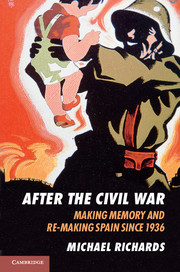Book contents
- Frontmatter
- Contents
- List of maps and tables
- Preface
- Acknowledgements
- Maps
- Introduction: cultural trauma in Spain
- Part I Setting the scene
- 1 War memories since 1936: political, moral, social
- 2 Democracy, civil war, and intimate violence in the 1930s
- Part II Memories of war during the Franco years
- Part III Memories of war after Franco
- Conclusion: the history of war memories in Spain
- Glossary and abbreviations
- Sources and select bibliography
- Index
- References
1 - War memories since 1936: political, moral, social
Published online by Cambridge University Press: 05 June 2013
- Frontmatter
- Contents
- List of maps and tables
- Preface
- Acknowledgements
- Maps
- Introduction: cultural trauma in Spain
- Part I Setting the scene
- 1 War memories since 1936: political, moral, social
- 2 Democracy, civil war, and intimate violence in the 1930s
- Part II Memories of war during the Franco years
- Part III Memories of war after Franco
- Conclusion: the history of war memories in Spain
- Glossary and abbreviations
- Sources and select bibliography
- Index
- References
Summary
The past is not over there on the date it took place, but here, in me.
On 1 April 1964 the principal Spanish national newspaper of the dictatorial era produced a lavish three-part souvenir issue with 120 heavily illustrated pages in commemoration of the twenty-fifth anniversary of the victory of General Franco. The three sections were dedicated in turn to ‘the past’, ‘the present’ and ‘the future’, with 1939 constituting ‘Year Zero’, the pivotal moment between ‘then’ and ‘now’. Franco had, after all, insisted on unconditional surrender. The recent past was of course an essential and contested area of Francoist legitimacy, and in 1964 the past would be temporally compressed by imagining it exclusively through a critical and tendentious account of the Second Republic, the democratic regime which had been inaugurated after elections in April 1931 and later destroyed during the civil war. As was typical, the image of the Republic as chaotic would be further distilled by focusing on the tumultuous period of Popular Front government, from February to July 1936, when the state resorted frequently to its coercive apparatus to maintain order. The 1964 supplement's first part, on the past – ‘from the Phrygian cap to the Hammer and Sickle’ (a title symbolising what for Franco supporters had been an inevitable descent from ‘liberty’ to ‘Bolshevism’ in the 1930s) – thus illustrated the dictatorship's self-justification and issued a thinly veiled warning for the present. The need to avoid a repeat of the conflict of the 1930s would form the backdrop to restricted political activity in the 1960s and the more open process of transition to democracy after Franco's death in November 1975. In April 1964, officially sponsored representations of the Second Republic as ‘socialising’, ‘leftist’ and ‘revolutionary’ gave sense to such warnings, at least to the conservative readership of ABC. Conflict and insecurity were accentuated as the essence of the democratic era. At a moment when the future was imagined in the shape of a monarchical succession to Franco, as predetermined by the Head of State himself, the past was therefore simplified. Officially, 1930s attacks upon the Republican state from within the army and the Catholic Church could be forgotten, as was any positive reflection on the modernising reforms introduced by Republican governments.
- Type
- Chapter
- Information
- After the Civil WarMaking Memory and Re-Making Spain since 1936, pp. 13 - 33Publisher: Cambridge University PressPrint publication year: 2013

